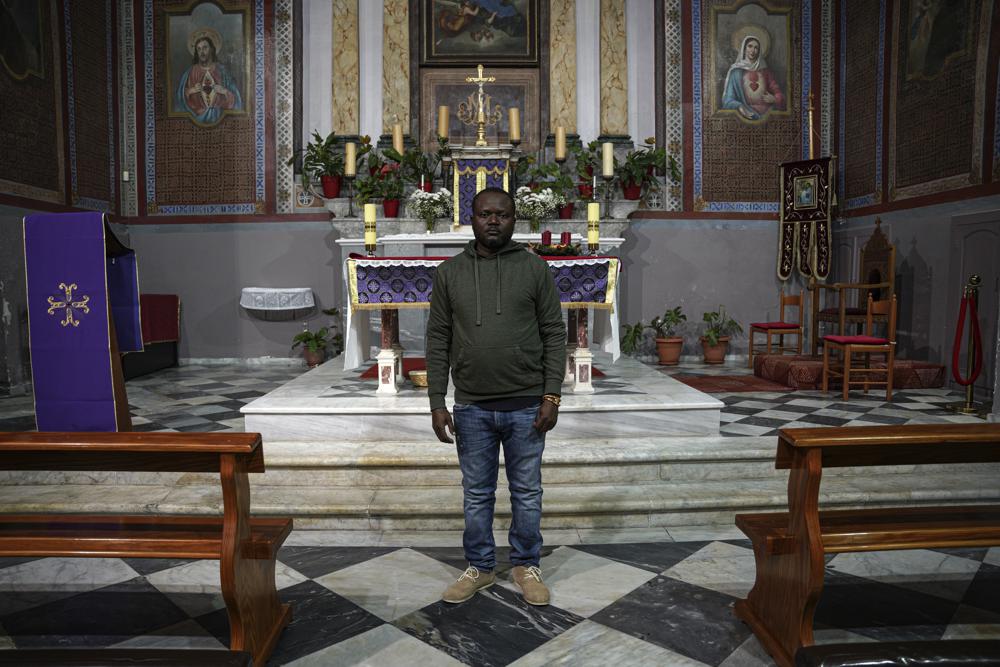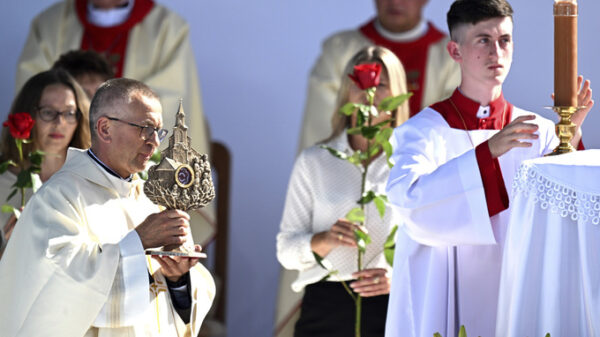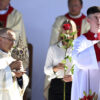Christian Tango Muyaka, a 30-year-old asylum-seeker from Congo, poses for a photograph inside a Catholic church in Mytilene port, on the northeastern Aegean island of Lesbos, Greece, Monday, Nov. 29, 2021. Muyaka will attend a Sunday service held by the pope at a new migrant camp on Lesbos. Pope Francis is heading back to the Greek island of Lesbos to meet migrants and asylum seekers for the second time in five years. (AP Photo/Panagiotis Balaskas)
LESBOS, Greece (AP) — When Pope Francis visited the Greek island of Lesbos in 2016, he was so moved by the stories he heard from families fleeing war in Iraq and Syria that he wept and brought a dozen refugees home with him.
Speaking to reporters on the way home that day, he held up a drawing handed to him by a child from the island’s sprawling refugee camp.
“Look at this one,” he said, revealing a bird neatly decorated in colored pencil, the word “peace” scrolled in English underneath it. “That’s what children want: Peace.”
Francis is returning to Lesbos this week for the first time since that defining day of his papacy, making a repeat visit to the island where hundreds of thousands of refugees and migrants have passed through on their journey to Europe.
But he will find attitudes toward migrants here have only hardened in the intervening five years, as they have elsewhere in Europe, with tensions flaring on the border between European Union country Poland and Belarus and more deadly crossings — most recently in the English Channel.
Francis will first stop in Cyprus, another predominantly Orthodox Christian country in the Mediterranean that is also coping with a rise in refugees so significant that the government is seeking to stop processing asylum claims. As he did in Lesbos five years ago, Francis has arranged for several would-be refugees in Cyprus to travel to Italy after his visit, Cypriot officials say.
“They are our brothers and sisters,” Francis said in a video message to Greek and Cypriot faithful before the trip. “How many have lost their lives at sea! Today our sea, the Mediterranean, is a great cemetery.”
The pontiff starts his five-day trip on Thursday in Cyprus before heading to Greece on Saturday. He returns home on Monday.
While Francis’ renewed messages of compassion and welcome for migrants isn’t quite resonating in European capitals, they are a welcome salvo for the migrants themselves.
“His presence here will strengthen us, spiritually, and give us hope, some comfort,” said Christian Tango Muyaka, a 30-year-old asylum-seeker from Congo who is due to participate in a Sunday service with the pope at a new migrant camp on Lesbos.
“It gives us faith, it strengthens our faith,” he said.
Muyaka was separated from his wife and youngest daughter a year ago on the Turkish coast when they scrambled to board a boat bound for Greece. He has had no news of what happened to them since.
The north coast of Lesbos, just 10 kilometers (six miles) from Turkey, served as the main landing point for boats crossing into Europe during the 2015-16 migration crisis.
Piles of discarded orange life vests covered beaches, local fishermen helped daily rescue operations, and island residents took pride in setting up campaigns to provide hundreds of refugees arriving daily with food and clothing.
Fast forward five years, and the welcome mat is gone.
Migrants reaching the eastern Greek islands are now being held in detention camps, newly built and funded by the EU. Coast guard patrols are instructed to intercept dinghies and boats heading west and send them back to Turkey.
The overcrowded camp on Lesbos that Francis was taken to in 2016 burnt to the ground last year during protests against pandemic restrictions.
And along Greece’s land border with Turkey, a new steel wall and hi-tech sensor network have been installed to stop illegal crossings.
Eva Cosse at Human Rights Watch said Francis’ visit will serve as an urgent reminder of the human nature of the crisis.
“At a time when people are suffering and their rights are threatened, having the pope standing up for them and expressing these concerns is more important than ever,” she told The Associated Press. “Since the pope’s last visit, Greece continues to host large numbers of asylum-seekers while failing to protect their rights.
“Thousands seeking refuge in Greece are violently pushed back to Turkey. Migrant children face homelessness and a lack of access to health care, education and food. And nongovernmental groups face legislative restrictions and criminal harassment by officials.”
Greek authorities deny allegations of summary deportations. They argue that tougher border policing is necessary to counter hostility by several EU neighbors accused of exploiting the crisis and to limit arrival numbers to manageable levels.
“(Francis’) message is that we are one world, that we don’t have borders, that everybody is a child of God. Look, this is the religious point of view,” said Dimitris Vafeas, the deputy director of Mavrovouni migrant camp on Lesbos where the pope will visit.
“In practical terms, I think Greece has delivered … so I think (Francis) will see calm faces. I don’t dare say happy faces, but calm for sure.”
Derek Gatopoulos reported from Athens. Nicole Winfield, in Rome, and Vangelis Papantonis, on Lesbos contributed to this report.
Copyright 2021 Associated Press. All rights reserved.




























